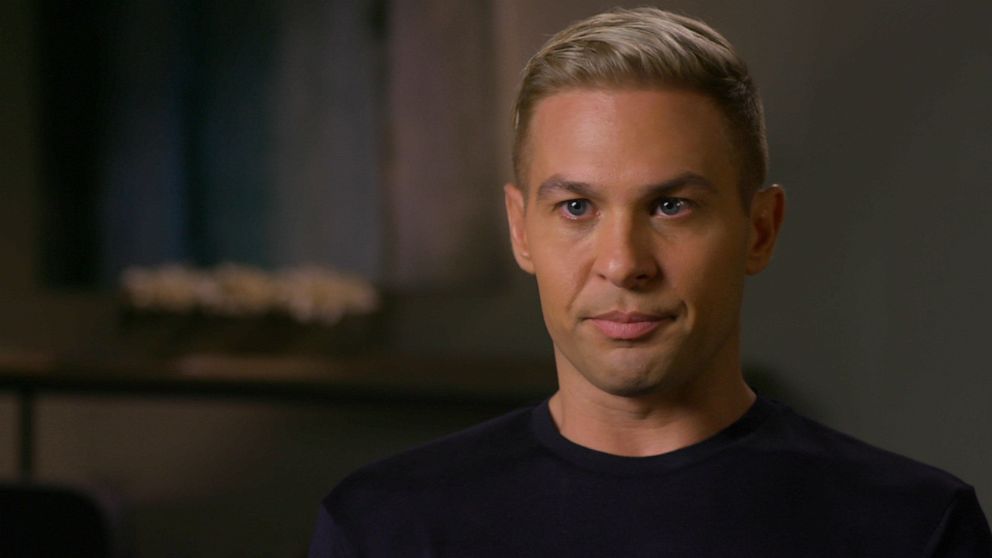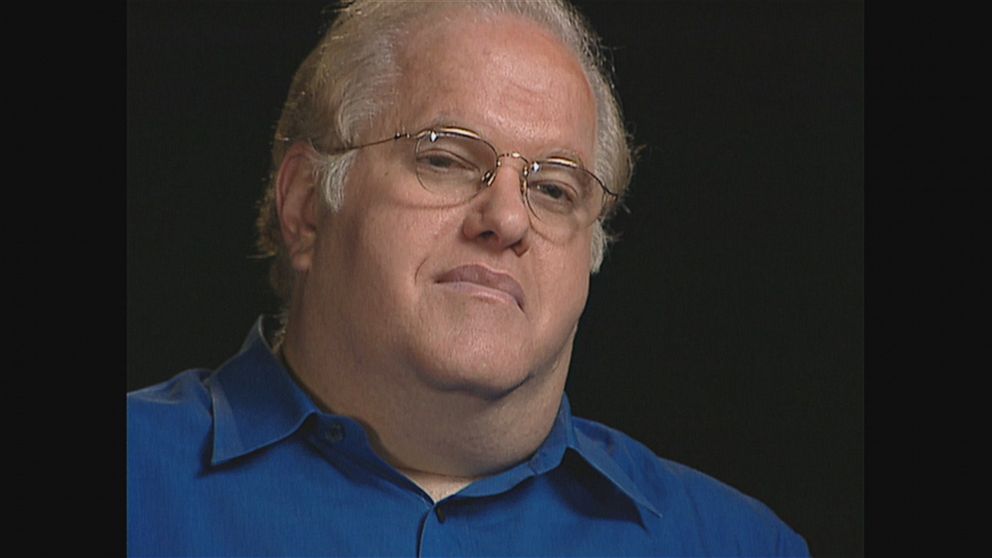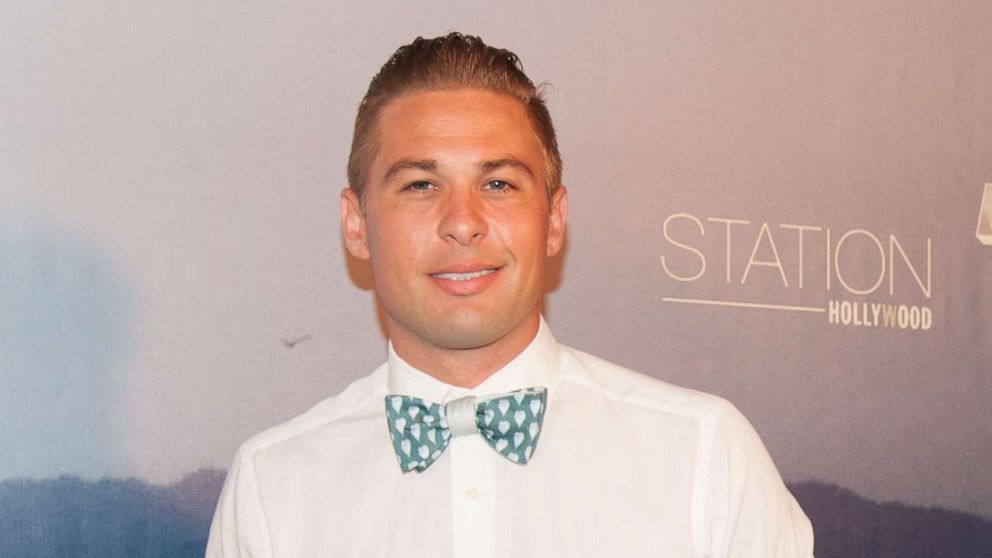Singer Sean van der Wilt felt 'uncomfortable' by what he says were disgraced music mogul Lou Pearlman's 'many advances'
Singer and songwriter Sean van der Wilt has worked hard to build a successful career in Hollywood after the arrest of his former manager, Lou Pearlman, and the collapse of Pearlman’s businesses.
Pearlman, who became famous in the ‘90s for creating Backstreet Boys and *NSYNC, was charged in 2007 with running a Ponzi scheme and defrauding investors out of close to $300 million.
Watch the full story on "20/20" FRIDAY, Dec. 13 at 9 p.m. ET on ABC
In an interview with ABC News, van der Wilt spoke about the five years he spent with Pearlman’s record label, TransContinental Records, trying to build his singing career and dealing with the "many advances" he says Pearlman made toward him during that time.

Van der Wilt said the disgraced boy bands mogul began making moves on him around three years after Pearlman first signed the then-21-year-old in 2001.
Pearlman pleaded guilty in 2008 to two counts of conspiracy, one count of money laundering and one count of making a false claim in a bankruptcy proceeding in connection to a multimillion-dollar Ponzi scheme involving his TransContinental empire.
He was sentenced to 25 years in prison and died of heart failure in 2016 while incarcerated.
Van der Wilt said he first met Pearlman in New York City in 2001 while van der Wilt was working as a performer for the dance troupe Chippendales, which Pearlman was an investment partner in at one point.
Pearlman had attended a few of his shows, van der Wilt said, and even approached him a couple of times to talk about an opportunity. But not knowing who Pearlman was at first, van der Wilt said he "blew him off."
"If I don't get a good vibe from somebody, then I don't necessarily talk or even exchange any business ideas at all," said van der Wilt.
Van der Wilt said he saw Pearlman again in 2001 at Michael Jackson’s 30th Anniversary Celebration concert at Madison Square Garden.
Van der Wilt, who was one of the King of Pop's backup dancers, said Pearlman was sitting in the front row of the arena with his band O-Town. By then, Van der Wilt had learned about Pearlman's connection to hugely successful boy bands. When the two spoke backstage, he said Pearlman offered to manage him and sign him to his record company.
In the months following Pearlman's offer, van der Wilt said they kept in touch. He said friends had warned him about going into business with the music mogul, referring to the lawsuits *NSYNC and Backstreet Boys had settled with Pearlman a few years prior. Armed with that knowledge, van der Wilt says he did his homework before negotiating the terms of his contract.
Over the five years that he worked with Pearlman, van der Wilt moved from New York City to Orlando, Florida, and then to Los Angeles. Van der Wilt said that behind Pearlman’s assurances that he had “big plans” for the singer, he also "always had an ulterior motive."
"After a while, working with him, he would just be lying to get out of a lie to get out of a lie...and it got to a point where I would just confront him on everything," he said. "I feel he wanted it to be genuine, but he was such a crooked man that he couldn't be genuine because he had so much shady crap going on."
Van der Wilt said that when Pearlman got arrested in 2007, his music hadn't been released and more than $1 million had been poured into his career.
"Luckily, I got out of owing a lot of money," he said.
Still, van der Wilt said he and Pearlman became good friends and expressed appreciation for Pearlman's attempts to boost his career.
"He went out of his way to make things happen. He was taking care of my life and trying to make something that I cared about so much happen because he believed in me," van der Wilt said. "You know what I mean? So, you can't necessarily hate him. Did he screw up my career ultimately? Yeah, he did."
Despite their friendly relationship, van der Wilt said he had to fend off numerous "uncomfortable" advances from Pearlman.
"The first couple times he put his arm around -- was hugging me -- but it was in a way [that it] was just a little too close for comfort," van der Wilt said. "By the third time, I was sitting on his bed, and he joked and fell on top of me. I was like, 'Whoa, Lou,' and he was like, 'Oh, come on. We're buddies.'"

Van der Wilt said it all came to a head one night while the two were watching a movie at Pearlman's Orlando mansion. Sitting in Pearlman's theater, van der Wilt said Pearlman put his arm on van der Wilt's leg and then around him. Van der Wilt claims Pearlman then leaned over and whispered something into his ear before grabbing his face and kissing him. The singer said he jumped up and asked Pearlman what he was doing. According to van der Wilt, Pearlman said, "What are you talking about? We're family."
Van der Wilt told Pearlman that "it's not a big deal" if he's gay. "I'm just not into this," he said he told Pearlman.
Van der Wilt said Pearlman then stormed out of the room and ignored him when he tried speaking to Pearlman again a few minutes later. Van der Wilt said he decided to leave the house, but when he got in his car, he began crying.
"When I left his house that day, I was completely scared," van der Wilt said. "Completely scared and thinking, 'God, maybe I...could have handled it in a different way.' There's nothing inside of me that wanted to move forward with any of that. I thought I should have probably handled it differently. … I was scared because my whole life was wrapped up with the company...and the head of all of that, I just called him out on something that he was uncomfortable with."
Van der Wilt said Pearlman didn't speak to him for two months following the confrontation, and he thought his record deal was in jeopardy because of it. During that time, van der Wilt said he struggled with whether he would have to appease Pearlman's advances in order to achieve his career goals.
"It all clicked with me when I stood up for myself. I really want my career. Did anyone else have to do that? It makes you think," he said. "And then it questions everything because you want your dream so bad. Then again, I know myself and I can't do that."
Van der Wilt said he'd called Pearlman several times and left "many messages" telling him that he was going to move back to New York City. Van der Wilt said that when Pearlman reached out to him months later, it was like nothing had happened.
Seth Abramovitch, who writes for The Hollywood Reporter, interviewed Pearlman while he was in prison and asked him about the rumors concerning inappropriate misconduct with some of his young performers.
"His explanation was that anyone whose star he actually launched were happy with him. ... If their careers fizzled, they had a grudge, and that's why they said these things about him," Abramovitch told ABC News.
Van der Wilt said that he realized he'd signed with Pearlman at a time when Pearlman's scheme was beginning to unravel. Over time, he said he began "noticing things" with regard to the "crumbling" TransContinental Records.
"I didn't know what was going on," van der Wilt said. "I didn't know the extent of any of it, but I just knew something was going down."
Van der Wilt said Pearlman showed him his inherent instinct for fraud when he was touring as an opening act for a boy band in Germany shortly before Pearlman was arrested. To try to boost van der Wilt’s name, Pearlman thought it would be a good idea to present him with a gold record on stage -- a certification meant to signify a certain number of records sold.
"I said to him, 'Well, the song hasn't gone gold. We haven't even released it yet," van der Wilt said.
"I know, but they don't know that. They won't know it. It'll blow up. I'll be really great. It'll be really great press. We'll get people to come," Pearlman responded, according to van der Wilt.
Despite van der Wilt's opposition to it, Pearlman came out with the record at the end of his performance and made the announcement. Van der Wilt said that the record had been glued to the back of a picture frame that looked like it had been bought from a bargain basement retailer. Yet, in that moment, van der Wilt acted like it was real, he conceded.
"I'm looking at it and acting like, 'Oh my God, this is amazing. Thank you so much, Germany.' In my head, I'm like, 'Nothing's going to come from this. I don't know why we're doing this. This is not even real.'"
Van der Wilt said he was also directly victimized by Pearlman’s fraud. He said Pearlman had bought a number of homes for his artists and had let him live in a $1.6 million home when he moved to Los Angeles.
"My mortgage was $8,000 a month. I lived there for two years," van der Wilt said. "The company never made one payment on it and I had no idea. … Once the house went into foreclosure, the record company called...and they said, 'Sean, we really care about you. You work so hard. … You got to get out of that house. Lou's never made one payment on it. He fled the country. He's not here anymore."
But when van der Wilt reached out to Pearlman, he says Pearlman brushed everything off.
"He's like, 'We'll talk. Everything's great. I'm traveling, getting things going for you — everything's happening," van der Wilt said.
What was happening was an international manhunt by federal authorities who had been investigating Pearlman’s TransContinental businesses. Based on a tip by a tourist, in 2007 authorities picked up Pearlman in Bali and brought him back to the U.S. to face numerous charges, including defrauding unsuspecting investors. But van der Wilt says his own careful contract negotiations saved the day for him.
"I put in my contract, if I had a full album ... and it's not released within a year, if the company is not going to work with me, and if anything happens or my record deal goes under, that I don't owe any of my recoup," van der Wilt said, referring to the production and living expenses record labels recover before the artists can begin earning money from their music. Van der Wilt said that when Pearlman got arrested, his music hadn't been released and more than $1 million had been poured into his career.
"Luckily, I got out of owing a lot of money," he said.
However, after Pearlman’s arrest, van der Wilt said he was back at "square one." He said nobody would sign him or work with him.
"I had nothing to do with it. But nobody would work with me and I couldn't touch my music… I couldn't release any of it," he said. " My attorneys told me I should step away from music for some years. I didn't know what to do, so I went back to being just solely a dancer."
Van der Wilt's career, though it had hit a bump, eventually started looking up again. He began working with Rihanna on a promo tour and booked a dancing role in the 2010 movie "Burlesque." Most recently, he worked with Cher as an associate choreographer and dancer, although he left that role to choreograph and appear in the ninth season of the FX show "American Horror Story." A producer on that show, he said, helped him land a choreography role on Fox's "911: Lone Star." Returning to what he called his favorite aspect of entertainment, singing, van der Wilt also just released a single called "Silence."
Van der Wilt said that although he considered Pearlman a friend, the music producer never apologized to him for everything he'd been put through.
"Even when I got kicked out of the house...never any apologies, never an email, never nothing," van der Wilt said.
Still, van der Wilt said he believes there was good in Pearlman.
"Lou did have a big heart. He did. He cared about people. It was very apparent. He [was] always hugging everybody. Everybody was his family and I know it deep down inside," he said. "I know he meant that. It's just, his way of thinking with money and wanting all the attention was crooked. That's how I feel."




